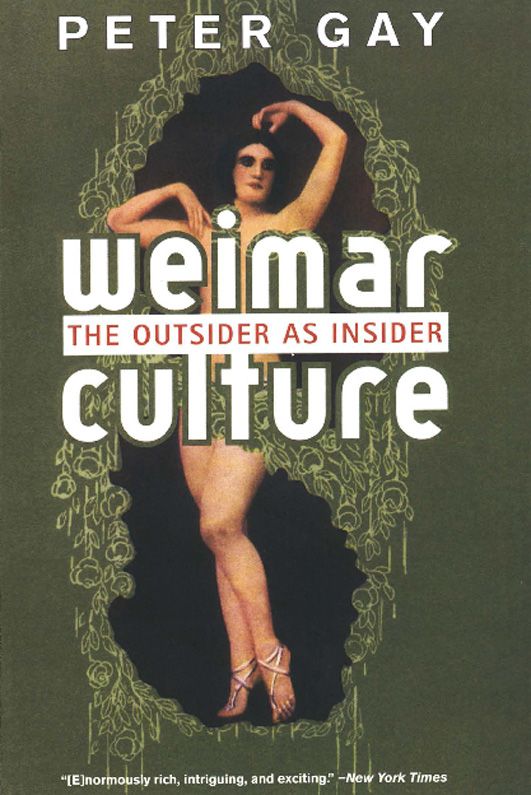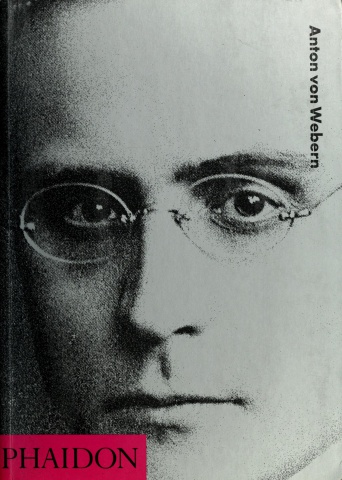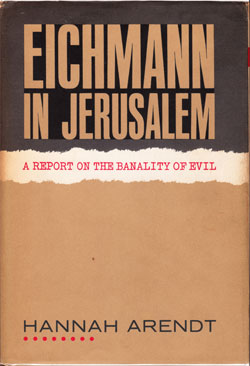Peter Gay: Weimar Culture: The Outsider As Insider (1968–) [EN, CR]
Filed under book | Tags: · 1910s, 1920s, 1930s, architecture, art, bauhaus, cinema, expressionism, film, germany, literature, modernism, music, nazism, philosophy, politics, psychoanalysis, theatre, weimar republic

First published in 1968, Weimar Culture is one of the masterworks of Peter Gay’s career. A study of German culture between the two wars, the book brilliantly traces the rise of the artistic, literary, and musical culture that bloomed ever so briefly in the 1920s amid the chaos of Germany’s tenuous post-World War I democracy, and crashed violently in the wake of Hitler’s rise to power. Despite the ephemeral nature of the Weimar democracy, the influence of its culture was profound and far-reaching, ushering in a modern sensibility in the arts that dominated Western culture for most of the twentieth century.
First published by Harper & Row, New York, 1968.
Publisher W. W. Norton, 2001
ISBN 0393322394, 9780393322392
205 pages
via chef
Review (Walter Laquer, The New York Times Books, 1968)
Review (Elizabeth Wiskemann, The Spectator, 1969)
Review (Sterling Fishman, History of Education Quarterly, 1970)
Weimar Culture: The Outsider As Insider (English, 1968/2001, EPUB)
Weimarksa kultura: Isključenik kao uključenik (Croatian, trans. Danja Šilović-Karić, 1999, added on 2014-8-3)
Malcolm Hayes: Anton von Webern (1995)
Filed under book | Tags: · biography, composing, music, nazism

In this biography of one of the twentieth century’s greatest composers, Malcolm Hayes sets Webern’s radical technical advances against the Romantic inheritance of nineteenth-century Austro-Germany, tracing the development of a man and his music.
Born into the Imperial, musical heritage of Vienna, Webern became captivated by Renaissance vocal music, and this student passion was to haunt his compositions all his life. A pupil of Schoenberg, he also came to use the twelve-note method, and combined this with his love of chamber music to create a sound that is entirely his own. Despite a prolific rate of composition in his early years, Webern’s music output is small and tends to extreme brevity. Tragically, he was accidentally shot and killed in the Allied occupation of Austria. His work has continued to influence musicians throughout the twentieth century and since.
Publisher Phaidon Press, London, 1995
20th-Century Composers series
ISBN 0714831573, 9780714831572
240 pages
PDF (77 MB, no OCR)
Comment (0)Hannah Arendt: Eichmann in Jerusalem: A Report on the Banality of Evil (1963–) [EN, DE, IT, CZ, PL, ES, RU]
Filed under book | Tags: · evil, ideology, nazism, politics, totalitarianism

“Originally appearing as a series of articles in The New Yorker, Hannah Arendt’s authoritative and stunning report on the trial of Nazi leader Adolf Eichmann sparked a flurry of debate upon its publication. This revised edition includes material that came to light after the trial, as well as Arendt’s postscript directly addressing the controversy that arose over her account. A major journalistic triumph by an intellectual of singular influence, Eichmann in Jerusalem is as shocking as it is informative—an unflinching look at one of the most unsettling (and unsettled) issues of the twentieth century.”
Originally appeared as a series of articles in The New Yorker, 1963
Publisher Viking Press, 1963
Revised and Enlarged Edition, 1965
New edition with an Introduction by Amos Elon, Penguin Books, 2006
Eichmann in Jerusalem: A Report on the Banality of Evil (English, 1963/2007, updated on 2021-2-25)
Eichmann in Jerusalem: Ein Bericht von der Banalität des Bösen (German, trans. Brigitte Granzow, 1964/2007, updated on 2021-2-25)
La banalità del male: Eichmann e Gerusalemme (Italian, trans. Piero Bernardini, 1964)
Eichmann v Jeruzalémě: zpráva o banalitě zla (Czech, trans. Martin Palouš, 1995)
Eichman w Jerozolimie: rzecz o banalności zła (Polish, trans. Adam Szostkiewicz, 1998)
Eichmann en Jerusalén: Un estudio sobre la banalidad del mal (Spanish, trans. Carlos Ribalta, 1999/2003, EPUB, updated on 2021-2-25)
Banalnost zla. Eykhman v Ierusalime (Russian, trans. Sergei Kastalsky and Natalia Rudnitskaya, 2008, DJVU)

